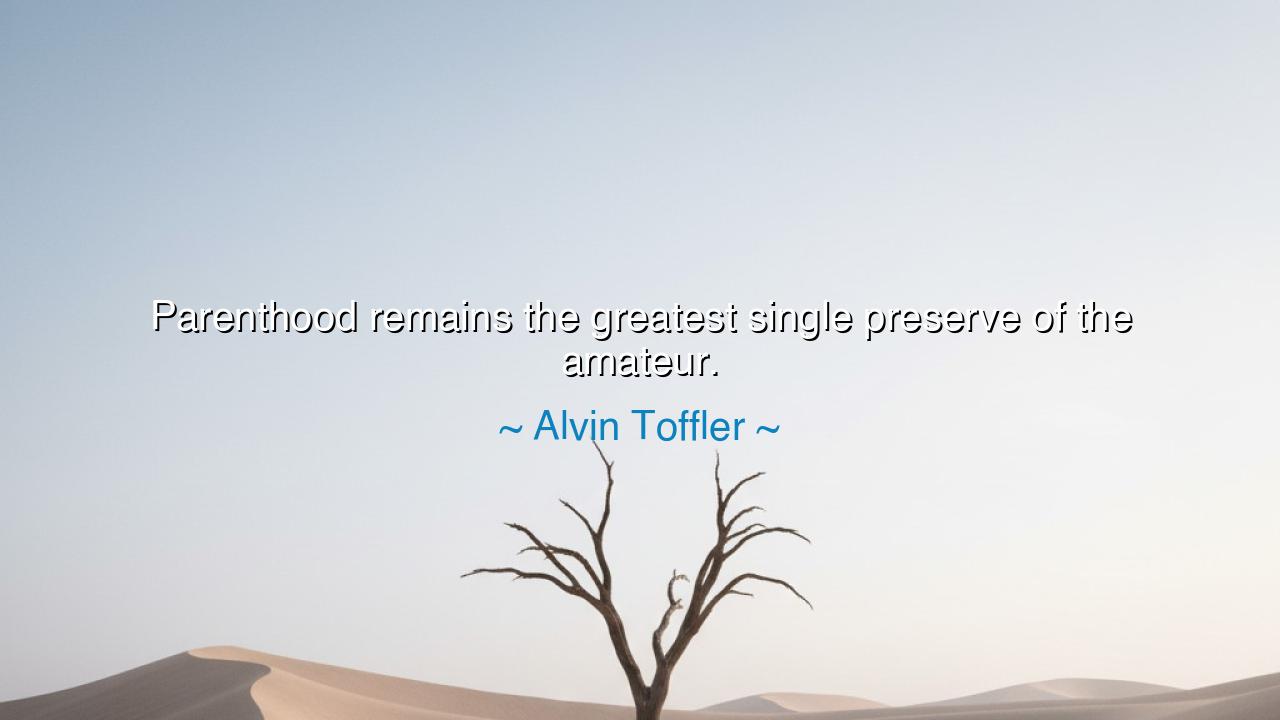
Parenthood remains the greatest single preserve of the amateur.






In the words of Alvin Toffler: “Parenthood remains the greatest single preserve of the amateur.” In this phrase lies a truth both humbling and profound. For in most crafts of life—medicine, law, architecture, art—training is given, mastery is sought, and experience is earned before one is entrusted with responsibility. But in parenthood, no apprenticeship exists. The child is placed into the hands of the untrained, and through love, trial, and error, they stumble toward wisdom. It is a calling so vast and so sacred that even the wisest feel like beginners.
The ancients would have smiled knowingly at Toffler’s words, for they too understood that parenthood cannot be perfected through books or lessons alone. Plato, who dreamed of philosopher-kings, also taught that the earliest education of a child begins not in schools but in the arms of the mother and under the watch of the father. And yet, those parents entered their role as amateurs, guided by instinct and love rather than professional expertise. The paradox is eternal: the most important task in human history—the raising of new generations—is entrusted not to the trained elite, but to ordinary souls.
History offers many examples of this paradox. Consider Mary Wollstonecraft Shelley, the mother of the famed author of Frankenstein. She did not live long to guide her daughter, and so young Mary was raised amid fragments of guidance, learning much through her own trials. Her father, though an intellectual, was unprepared for the emotional work of parenthood, and Mary’s journey was shaped by this mixture of love, absence, and imperfection. Yet from such “amateur” beginnings came genius, resilience, and imagination. Toffler’s observation is here made visible: that greatness can emerge even when parents are stumbling, imperfect, and human.
The power of the amateur in parenthood lies not in technical skill, but in devotion. Professionals may master their craft with precision, but amateurs bring to their work a raw passion, a willingness to learn through failure, and an authenticity that cannot be taught. Parents, though untrained, pour themselves into the task with an intensity unmatched, for the stakes are not medals or rewards, but the very soul and future of a child. In this sense, to be an amateur is not a deficiency but a mark of humanity itself.
Toffler also reminds us of humility. In a world obsessed with experts, we must remember that no one begins parenthood as a master. There is no perfection, only persistence; no formula, only love and effort renewed each day. The wisest parents are not those who boast of mastery, but those who admit their inadequacies, who learn alongside their children, and who understand that even mistakes can be transformed into lessons. The amateur spirit, humble and open, may in fact be the truest path to parental greatness.
The lesson is clear: do not fear your inadequacy in raising children. To feel unprepared is to be human. What matters is not flawless skill, but a willingness to love, to learn, to adapt, and to endure. Children do not require perfect parents; they require parents who are present, striving, and sincere. The amateur’s heart, when filled with devotion, becomes more powerful than the professional’s expertise.
Practical action flows from this truth: embrace your role as an amateur with courage. Read and learn, but do not despair when you stumble. Ask for help from elders, but trust your heart in guiding your children. Be humble enough to admit mistakes, and wise enough to correct them. And above all, remember that the most profound education you give your child will come not from polished technique, but from the authenticity of your love and presence.
Thus, Toffler’s words echo like the wisdom of the ancients: parenthood is the greatest preserve of the amateur, not because it is unimportant, but because it is too important to wait for perfection. Humanity has endured through this paradox—that untrained hands, guided by love, can shape the destiny of the world. And in this, there is both humility and hope for all who bear the noble title of parent.






AAdministratorAdministrator
Welcome, honored guests. Please leave a comment, we will respond soon